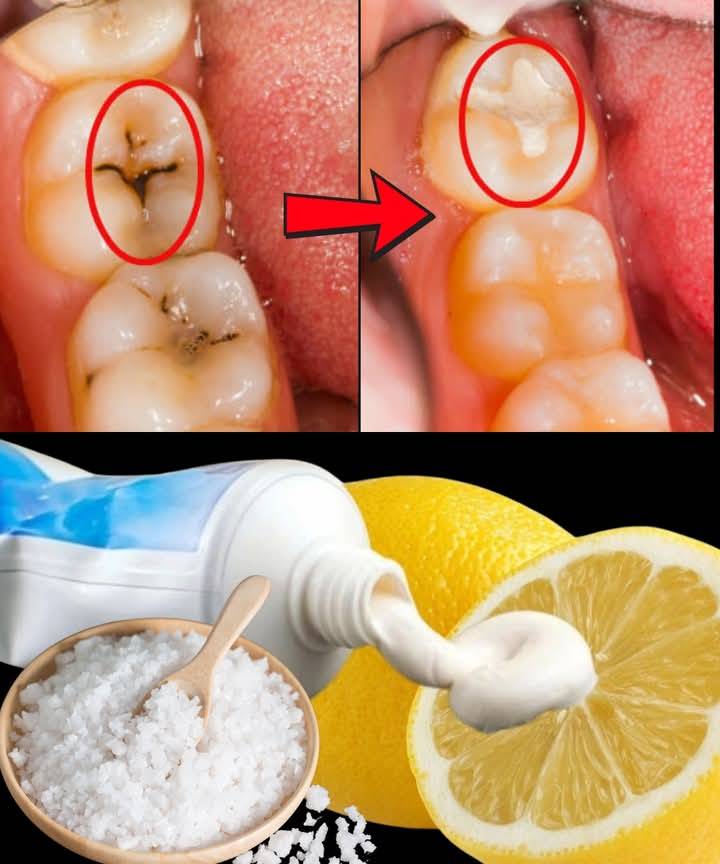ADVERTISEMENT
**How to Naturally Repair a Cavity and Strengthen Your Teeth**
A common dental concern many people face is the development of **cavities**—those pesky holes in your teeth caused by decay. While cavities often require treatment from a dentist, there are natural methods and lifestyle changes that can help repair and strengthen your teeth, potentially preventing further damage. Though it’s important to note that cavities that have progressed significantly still require professional dental intervention, early-stage cavities may be able to be reversed or strengthened with natural remedies and proper oral hygiene.
In this article, we’ll explore how to naturally repair a cavity, prevent tooth decay, and strengthen your teeth using simple, everyday techniques and ingredients.
### Why Do Cavities Form?
Cavities are caused by a combination of factors that allow **plaque** and bacteria to build up on the surface of your teeth. When sugars and starches are left on your teeth, they feed the bacteria in your mouth, which then produce acids that erode the tooth enamel. Over time, this erodes the hard outer layer of your teeth, leading to cavities. Some common causes of cavities include:
– Poor oral hygiene (not brushing and flossing regularly)
– Frequent consumption of sugary foods and drinks
– Lack of fluoride
– Dry mouth (reduced saliva production)
– High levels of bacteria in the mouth
Fortunately, there are natural ways to repair early-stage cavities and maintain healthy teeth by addressing the underlying causes of tooth decay.
### Natural Ways to Repair and Strengthen Your Teeth
While you should always consult a dentist for professional care, certain natural remedies and changes in your diet and oral care routine can help your teeth remineralize and strengthen. Here are some effective methods for naturally repairing a cavity:
#### 1. **Maintain Good Oral Hygiene**
One of the most crucial steps in repairing a cavity naturally is maintaining **excellent oral hygiene**. Brushing and flossing regularly help remove food particles and plaque, which can contribute to the formation of cavities.
– **Brush your teeth twice a day** using a fluoride toothpaste. Fluoride helps remineralize tooth enamel and prevent further decay. Consider using a soft-bristled toothbrush to prevent damaging your enamel.
– **Floss daily** to remove plaque and food debris between your teeth where your toothbrush can’t reach. This reduces the chance of cavities forming in these hard-to-reach areas.
#### 2. **Oil Pulling with Coconut Oil**
**Oil pulling** is an ancient technique used to improve oral health by swishing oil around in your mouth. The most popular oil for this practice is **coconut oil**, which has **antibacterial** and **antifungal properties**. Oil pulling can help remove plaque buildup and bacteria, thereby preventing tooth decay and potentially allowing early-stage cavities to remineralize.
How to do it:
– Take a tablespoon of **coconut oil** and swish it around your mouth for **15-20 minutes**. Be sure to push and pull the oil through your teeth, ensuring it reaches all areas of your mouth.
– After the oil pulling session, spit the oil into a trash can (not the sink, as it can clog pipes) and rinse your mouth with water.
– Repeat daily for optimal results.
#### 3. **Use Calcium and Phosphorus-Rich Foods**
Your teeth are made primarily of **hydroxyapatite**, a crystalline structure made up of **calcium** and **phosphorus**. Eating a diet rich in these minerals can help strengthen your teeth and potentially repair early cavities by encouraging remineralization.
Foods high in **calcium** and **phosphorus** include:
– **Dairy products**: Milk, cheese, yogurt
– **Leafy greens**: Kale, spinach, collard greens
– **Nuts and seeds**: Almonds, sunflower seeds, sesame seeds
– **Fish**: Salmon, sardines (with bones), mackerel
– **Eggs**: Rich in both calcium and phosphorus
Adding these foods to your diet can help replenish the minerals that your teeth need to remain strong and resilient against decay.
#### 4. **Incorporate Vitamin D into Your Diet**
**Vitamin D** plays a crucial role in calcium absorption, which directly impacts the health of your teeth. Without sufficient vitamin D, your body struggles to absorb calcium effectively, which can lead to weakened teeth and bones.
Some natural sources of **vitamin D** include:
– **Sunlight**: The body produces vitamin D when exposed to sunlight. Aim for at least 15-20 minutes of sun exposure a few times a week.
– **Fatty fish**: Salmon, sardines, mackerel, and tuna are excellent sources of vitamin D.
– **Egg yolks**: Eggs contain small amounts of vitamin D.
– **Fortified foods**: Some foods like milk, orange juice, and cereals are fortified with vitamin D.
If you live in an area with limited sunlight or have difficulty getting enough vitamin D through food, consider speaking to a healthcare provider about supplementation.
#### 5. **Remineralizing Toothpaste**
Some natural toothpaste brands contain ingredients designed to help remineralize enamel and repair early cavities. Look for toothpaste that includes **calcium phosphate**, **fluoride**, or **hydroxyapatite**, which are known to help restore the minerals in your tooth enamel and reduce further decay.
For Complete Cooking STEPS Please Head On Over To Next Page Or Open button (>) and don’t forget to SHARE with your Facebook friends
ADVERTISEMENT
